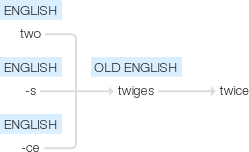Twice
late Old English twiges, from the base of two + -s3 (later respelled -ce to denote the unvoiced sound); compare with once.
wiktionary
From earlier twise, from Middle English twies, twiȝes, from Old English twīġes(“twice”), from twīwa, twīġa("twice"; whence Middle English twie(“twice”)) + -es(adverbial genitive ending). Related to Saterland Frisian twäie(“twice”), Middle Low German twiges, twies(“twice”), Middle High German zwies(“twies”). Compare also twi- meaning two or both.
etymonline
twice (adv.)
"two times, on two occasions, in two instances," late Old English twies, from Old English twiga, twigea "two times," from Proto-Germanic *twiyes (source also of Old Frisian twia, Old Saxon tuuio), from PIE *dwis-, adverbial form of root *dwo- "two." Spelling with -ce reflects the voiceless pronunciation.
Life is as tedious as a twice-told tale
Vexing the dull ear of a drowsy man.
["King John," III.iv.]
Think twice, then speak was an "old Prouerbe" by 1623. At twice, though less common than at once, means "at two distinct times; by two distinct operations."
